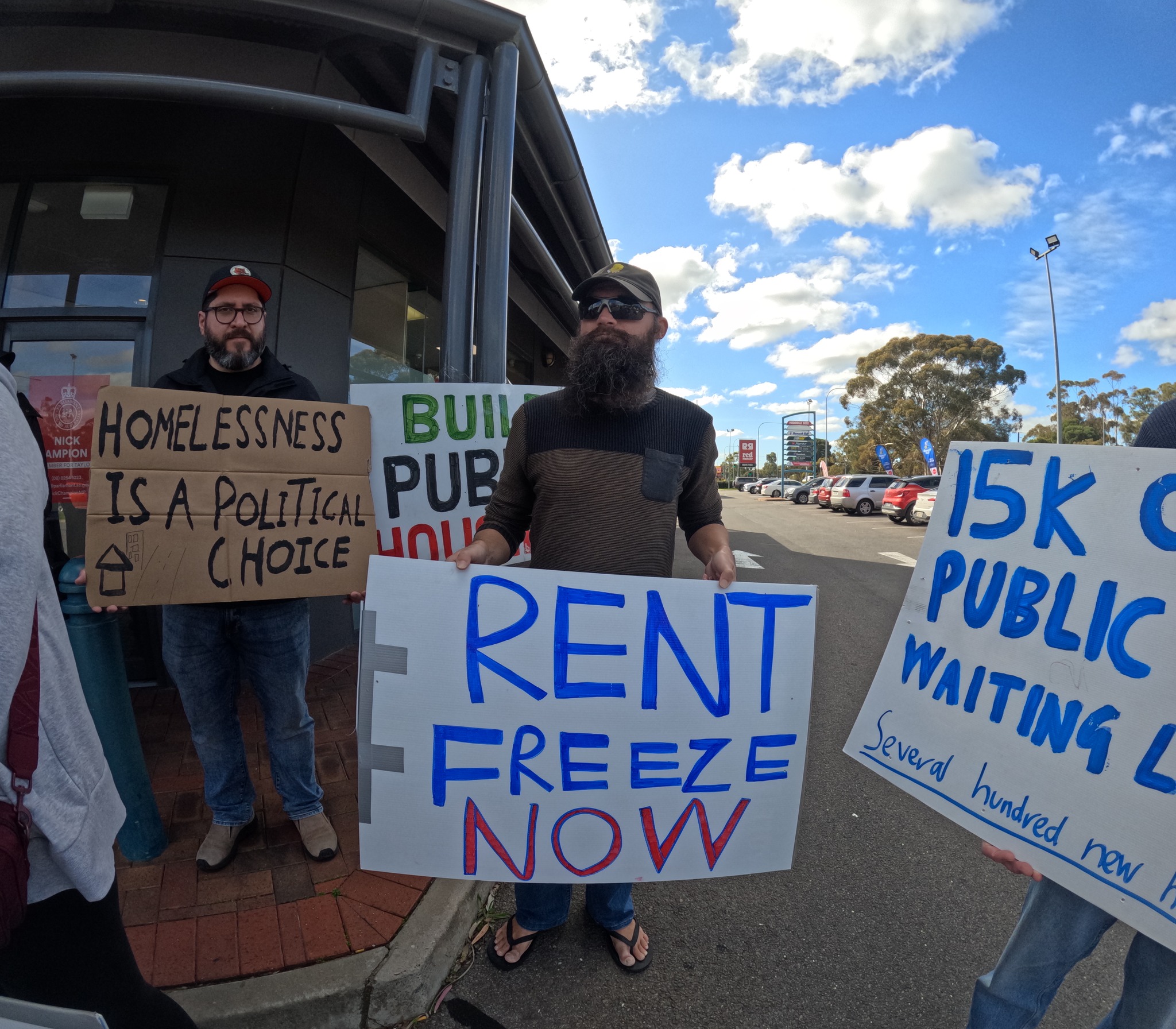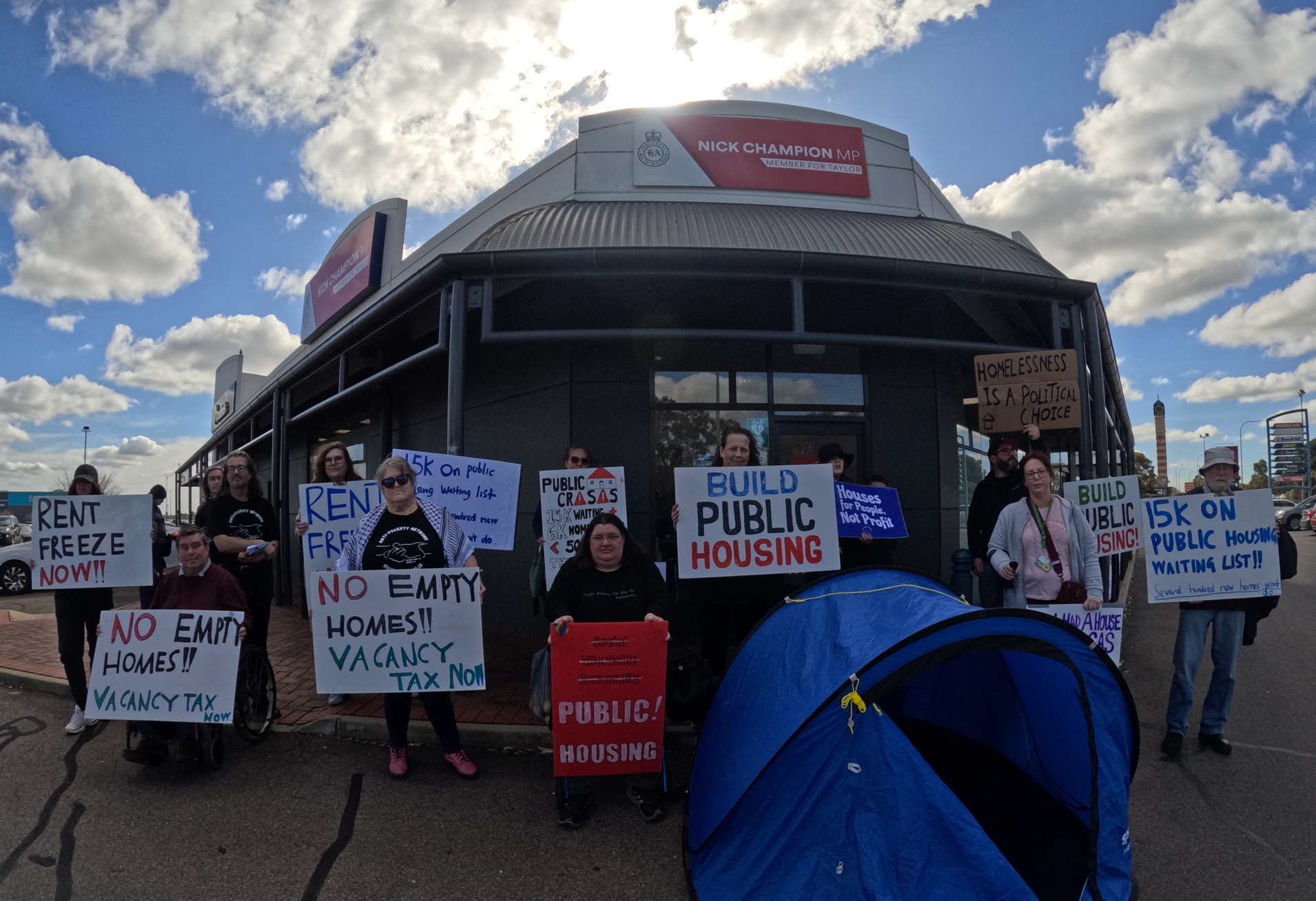
After nearly three and a half years in office, the South Australian Labor Premier Peter Malinauskas has barely made a dent in the state’s acute housing shortage.
Does the government view solving the crisis as a priority? The evidence shows clearly that it does not.
Labor claims to be building new public homes at a rate of about 200 per year. But the last census showed more than 7400 homeless, with the number trending upward. Available figures show 15,700 people now on the waiting list for public housing, with 3200 in the most urgent category.
This dire situation brought 25 community members together on August 7 in a spirited picket outside Housing Minister Nick Champion’s electorate office.
The Homelessness Week action was called by Anti-Poverty Network SA (APNSA), a grassroots, lived-experience organisation, that fights for an end to the marginalisation and punishment of people living in poverty.
At the picket, placards held by the protesters demanded: “Build public housing!”, “Houses for people, not profit!”, and “No empty homes — Vacancy tax now!”
Among the speakers was Aislinn, a disabled single mother who has been living in emergency accommodation since May. Aislinn recounted being forced to apply for rentals she could not possibly afford—a kind of “Mutual Obligations” for homeless people.
Prison abolition activist Tabitha Lean described how incarcerated women experience high rates of homelessness and poverty on their release. Such women, she explained, are virtually ignored in the advocacy conducted by community sector organisations.
Another speaker was Sara Walker, a job seeker and longtime anti-poverty advocate who coordinates APNSA’s Northern Suburbs Branch. Walker related how she and her partner, a cancer sufferer, had barely escaped having their home sold up from beneath them after they fell behind on their council rates.
What will it take to make homelessness a rarity in South Australia? Ultimately, this will need determined action by a government in Canberra willing to take on the wealthy interests that profit from exploding house prices and rents. But there is still plenty that state governments, despite their much their smaller revenue bases, can do.
Anti-Poverty Network SA is calling on Premier Malinauskas and his government to place an emergency freeze on rents, after years of skyrocketing increases. In the five years to March, rents in greater Adelaide rose by a staggering 55%, to a level higher than in Naarm/Melbourne.
Also needed is action on the tens of thousands of dwellings —between 5-8% of the total in most suburbs — kept vacant by their owners.
These measures would pass effortlessly through parliament if Labor was to back them. But whatever the needs of workers and the poor, Malinauskas and his ministers are too timid and conservative to pick serious fights with landlords and property speculators.
The government in 2023 banned no-cause evictions, requiring that landlords provide an approved reason for terminating or choosing not to renew a lease. After years of advocacy by housing and poverty organisations, this was a significant gain for renters.
Nevertheless, landlords are still able to raise rents every twelve months. With annual double-digit increases an established practice, renters of modest means remain at high risk of being forced out of their homes.
As rents spiral, homelessness services are struggling to cope with increased demand. Meanwhile, their funding is in decline.
Productivity Commission data shows that total government funding for homelessness services in South Australia fell by 11% between the 2021-22 and 2023-24 financial years. For each person, the state spends 10% less on homelessness services than the national average, and just over half of the figure in the ACT.
In all, around 18,000 people access homelessness services in SA each year. By any measure, that’s an emergency.
And, as one of the speakers at the August 7 picket remarked: “In an emergency, you drop what you are doing, and do everything in your power, everything it takes”.
It will take sustained, mass community pressure to win a housing system that puts our needs first—and the stakes have never been higher.
[Pas Forgione is Campaigns Co-Coordinator for the Anti-Poverty Network SA.]
apnsa_fb_2_august_7.jpg

apnsa_fb_3_august_7.jpg
